Meet the 2019 Legal Rebels
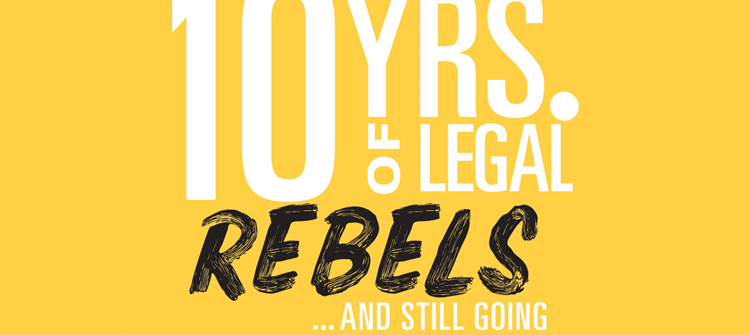
When the ABA Journal named the first class of Legal Rebels 10 years ago, the legal industry was undergoing rapid transformation. The Great Recession had brought about radical structural changes to the way customers and clients demanded legal services. Attorneys, as they are wont to do, were slow to adapt. There were some within the legal industry, however, who were ahead of the curve, and the Journal set out to spotlight those innovators and visionaries. At the time, the big question was whether these outliers would become part of the establishment within a decade’s time.
Ten years later, it’s clear that many of the same issues that drove the original class of Legal Rebels to look for solutions outside the mainstream are still prevalent. Access to justice remains a major obstacle for a vast majority of Americans. While technology has become an integral part of many lawyers’ practices, it is still viewed with suspicion or ignorance by a large swath of the legal industry.
So, as we celebrate the 10th anniversary of Legal Rebels, the need to highlight innovators and visionaries remains as important today as it was in 2009. For this year’s edition, we partnered with the ABA Center for Innovation to feature lawyers, legal professionals and technologists who continue to push for change. Time will tell whether 2029 will be significantly different than 2019—or 2009.
To read longer profiles of each Rebel, visit LegalRebels.com

Rohan Pavuluri and Jonathan Petts. Photo by Arnold Adler/ABA Journal
Going for Broke
Rohan Pavuluri and Jonathan Petts joined forces and took on Chapter 7 bankruptcy
By Stephanie Francis Ward
When growing up, Rohan Pavuluri and Jonathan Petts never had reason to think much about Chapter 7 bankruptcy. Both came from well-off families and graduated from Ivy League universities.
Nevertheless, they believe strongly that the law should not discriminate based on income. And it was that guiding principle that drove them to form the nonprofit company Upsolve, which generates free Chapter 7 bankruptcy forms for people who can’t afford lawyers.
“There are so many complicated, scary things in the law because of the way that the law has been written,” says Pavuluri, 23, a 2018 Harvard University graduate whose degree is in statistics.
One must have a below-median income to use Upsolve. Petts, 39, who got his undergraduate and law degrees from the University of Pennsylvania, estimates that on average, a user is between $20,000 and $40,000 in debt. Among the 410 individuals who used Upsolve in 2018 to generate bankruptcy forms, 98% received a discharge, according to Pavuluri.
Pavuluri and Petts met in 2016 at a New York Legal Aid Society luncheon. Pavuluri had been awarded a Harvard fellowship centered on finding ways to help low-income families navigate bankruptcy court, and he had been talking with judges, lawyers and parties at U.S. Bankruptcy Court in New York City. Petts, meanwhile, was working as an in-house attorney for Rassier Properties, a real estate development and management business owned by his mother’s family. “We hit it off immediately and started working together full time the next day,” Petts says.
One of the first things the two did was create a list of questions in an Excel spreadsheet that they wanted to ask bankruptcy filers. Then they created a questionnaire prototype using the online software Typeform. Once they got initial validation from that, they made the software in Docassemble, an open source platform created by fellow 2019 Legal Rebel Jonathan Pyle. Users for Upsolve’s 2016-17 pilot project came from various New York nonprofits, including the Brooklyn Volunteer Lawyers Project.
“The Upsolve model is fantastic,” says Pamela Foohey, a bankruptcy law professor at Indiana University Bloomington. “Filing for Chapter 7 is a task that you do not need a highly trained lawyer for.”
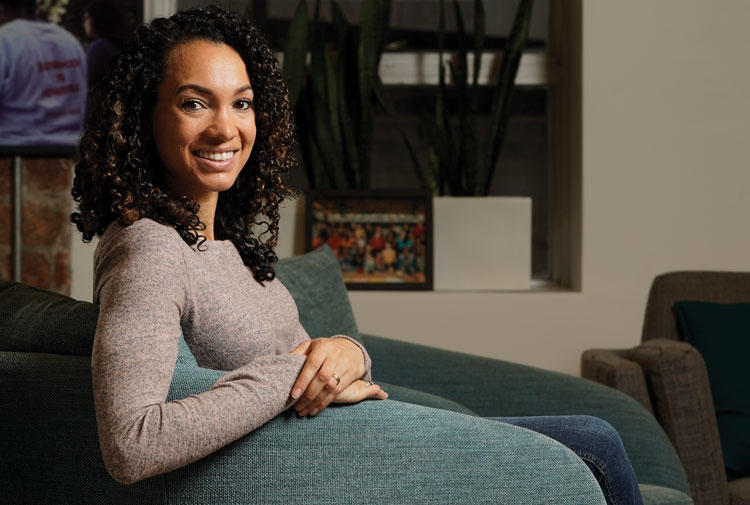
Photo of Gina Clayton-Johnson by Tony Avelar/ABA Journal
Healing Power
Gina Clayton-Johnson helps women who know what it’s like to have a family member locked up
By Stephanie Francis Ward
When Catalina Palacios got an email nominating her to join Essie Justice Group, she didn’t know why.
“I thought, ‘For what? I never do anything,’ ” says the Oakland, California, health educator who was nominated by her daughter.
Thinking that it could help her child, Palacios decided to join the 5-year-old organization, which centers on empowering women with loved ones who are behind bars so they can work together to end mass incarceration. Part of the program is a nine-week session that focuses on collective healing, sharing resources and helping participants advocate for themselves and others.
“Once I got there, I realized that my daughter was OK, and I was the one who needed support,” Palacios says. “We go through this empowering process so we can advocate for each other.”
Gina Clayton-Johnson, a 2010 Harvard Law School graduate, founded the organization, named after her great-grandmother, in 2014. She says many women are nominated by people who are in prison.
Besides the sessions, Essie Justice Group organizes around ending the money bail system. It published a national report about women and incarceration in 2018 and has been part of a national Mother’s Day event to bail black mothers out of jail. This year, they bailed out two women in California.
“I realized that there’s a big problem with mass incarceration that we’re not seeing as much research on—that one in four women have a family member in prison,” she says, citing the group’s 2018 report, titled Because She’s Powerful: The Political Isolation and Resistance of Women With Incarcerated Loved Ones.
Essie Justice Group recently opened a second office, in Los Angeles, where Clayton-Johnson now lives.
So far, 150 women have completed the Essie Justice Group sessions. Two weeks before Mother’s Day 2019, the group received 300 nominations for the next cohort.
“This is where our potential lies because if we can build a community of love and power with all of these 300 women, that can look like the leadership we need to reconstruct what systems of care and community really look like,” Clayton-Johnson says.
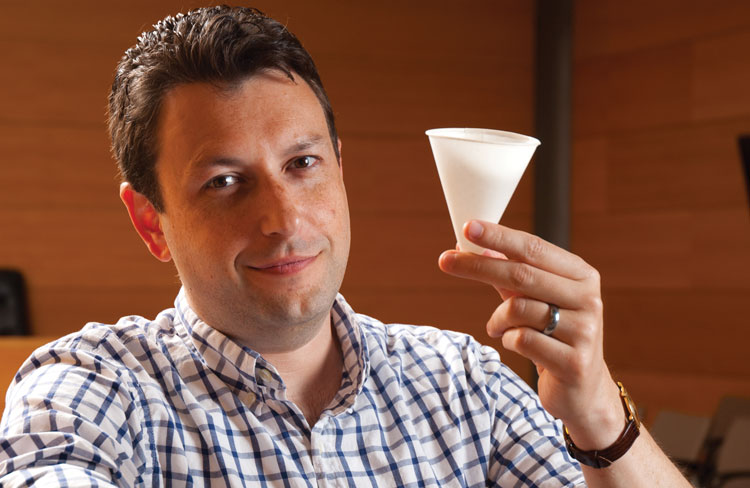
Photo of Keith Lee by David Mudd/ABA Journal
Chat at a ‘Virtual Watercooler’
Keith Lee looked for a place online where lawyers could communicate freely—so he created it
By Amanda Robert
With the rise of Twitter and hashtags like #lawtwitter, more lawyers around the world are connected and engaged in public discussions about the law.
But Keith Lee still thought there was something missing—they couldn’t always talk freely, and many weren’t using their real names.
“That’s not a new thing; it’s one of the reasons bar associations exist,” he says.
His solution? LawyerSmack, a private online community for lawyers who want to share ideas and brainstorm problems. He launched the site in 2017 and now has more than 350 members who exchange an average of 15,000 messages each week.
LawyerSmack allows members to communicate via 100 different channels on Slack, an internal, real-time messaging tool. There are channels for specific practice areas and states. There are also channels for nonlegal topics, including food and sports.
“This gives you a virtual watercooler that you can pull up on your screen or your second monitor and just leave it there,” Lee says.
Lee, 41, grew up as a self-described “computer-dork kid” in Birmingham, Alabama. He graduated from the Birmingham School of Law in 2010 and started as an associate at insurance defense firm Fish Nelson & Holden in Birmingham. In 2012, Lee and a couple of law school classmates opened the Hamer Law Group in Birmingham, advising individuals and businesses on tech startups, contract disputes and intellectual property.
Lee hopes that LawyerSmack provides a modern-day bar association for technology-savvy lawyers.
“There is this new generation of lawyers who want community, who want to connect with other lawyers, but they want to do it the way they’ve grown up doing things,” says Lee, who lives in Birmingham with his wife and 9-year-old son.
Future plans for LawyerSmack include improving the referral process. Brian Lynch, an intellectual property attorney in San Diego and LawyerSmack administrator, needed local counsel in Indiana and turned to LawyerSmack members, who immediately referred someone.
“It’s a place where it’s easy to reach out and say, ‘I have this problem,’ ” he says. “There is always someone there, and it’s really useful for that type of brain trust to spring to life and help you.”
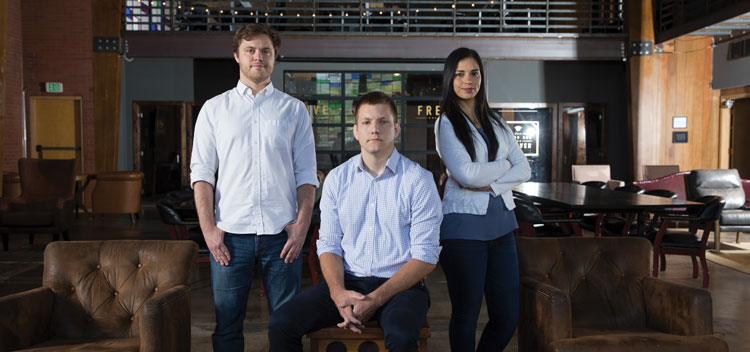
SimpleCitizen founders Sam Stoddard, Brady Stoddard and Ayde Soto. Photo by Benjamin Hager/ABA Journal
For Better
After frustration, SimpleCitizen founders Sam Stoddard, Brady Stoddard and Ayde Soto resolve to make the immigration process easier
By Jason Tashea
Thanks to love—and subpar customer service—immigration is getting simpler.
Two of the three founding members of the immigration software company SimpleCitizen have gone through the U.S. immigration process after getting married, and both were left wanting by their legal counsel.
“Sometimes attorneys aren’t the best at customer service or user experience,” says Ayde Soto, 34, chief technology officer at SimpleCitizen, who emigrated from Mexico to the U.S. five years ago.
CEO Sam Stoddard, 33, had a similar experience when helping his wife, who is from South Korea, immigrate to the U.S.
A student at Brigham Young University at the time, he sought help from an attorney who ran informational sessions for students. He says the lawyer took a condescending tone and used the meetings as a chance to upsell her services.
With this backdrop, and the help of chief marketing officer Brady Stoddard, 30—he’s a nephew of Sam Stoddard’s—SimpleCitizen was born in 2015. Based in Utah, the company isn’t a vendetta against attorneys. Rather, it helps immigrants and their families navigate a costly and confusing system in an inexpensive and efficient way.
The program is, as the name indicates, pretty simple: A user logs on to the site and fills in relevant information about the applicant. Once the data collection is complete, the reams of forms are automatically populated. This service costs $249. For an extra $99, an attorney will review the application.
Being consumer-facing wasn’t always the plan. In the beginning, the Stoddards thought they’d build a tool for lawyers. However, when they reached out to immigration firms across Utah to solicit feedback, they didn’t receive a single response.
So they chose the “path of least resistance,” says Sam Stoddard, and made a platform for consumers needing help with green card and citizenship applications.
Claudia Soto—no relation to Ayde Soto—used the product to immigrate to the U.S. from Costa Rica.
“When I saw my application printed out—after I filled in all the information and I uploaded supporting documents—I was in shock,” she says. “I was so thankful I didn’t have to fill out every single line.”

Photo of Dorna Moini by Earnie Grafton/ABA Journal
Escape From Rote
Dorna Moini’s software helps legal aid groups and law firms automate users’ form-filling
By Lorelei Laird
When Dorna Moini was an associate at Sidley Austin from 2015 to 2017, she welcomed the opportunity to do pro bono work.
“Some of the initial tasks I did were rote, like handwriting declarations or repeated entry of information on multiple forms, and I felt this wasn’t the best allocation of my time,” says Moini, 30, who graduated from the University of Southern California Gould School of Law in 2012.
So Moini came up with a way to automate the form-filling. Working with software engineer Michael Joseph—now her chief technology officer—she developed a software tool they now call Documate. It permits attorneys to create their own online forms that guide users through the process of completing them. They can be used for filling out any kind of legal form—name changes, business formation, even intake of new clients—that doesn’t require a lot of analysis or carry a lot of risk. The goal is to free up lawyers for the tasks that require human supervision.
Moini and Joseph had originally planned to make Documate a tool exclusively for civil legal aid groups. However, it attracted a huge amount of interest, including from people in private practice. Documate doesn’t charge legal aid organizations for its software, but it sells to all sizes and types of private-practice firms and even to nonlegal organizations.
One client and fellow legal tech startup using Documate in a for-profit way is Hello Divorce, a Bay Area company that combines guidance for doing parts of a California divorce yourself with traditional legal services. Founder Erin Levine says Documate is the anchor of Hello Divorce’s guided interview process, which helps clients fill out forms they can file in court. Documate also uses Docassemble (see page 60) as a back-end tool.
“Dorna’s software is a game-changer for pro se [parties],” says Levine, also a Bay Area family lawyer. “It’s one very important tool in expanding access to justice.”
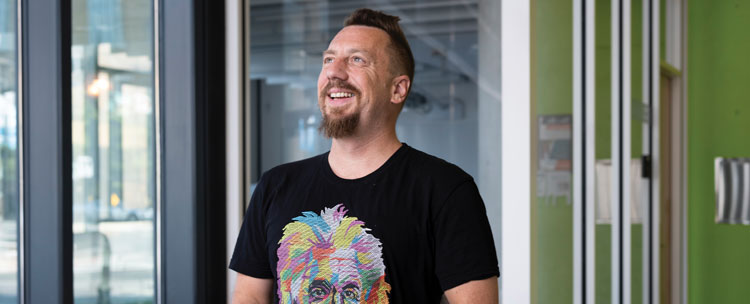
Photo of Colin Starger by David Hills/ABA Journal
True Calling
A seminal 1990s event sparked Colin Starger’s devotion to aiding criminal defendants and inmates
By Amanda Robert
Not many people can point to one defining moment that alters the course of their life. Colin Starger can—it was the brutal beating of Rodney King by Los Angeles police in 1991.
Starger was working as a software engineer at a startup firm in Silicon Valley when he participated in protests in San Francisco over the subsequent not-guilty verdict for the involved officers. He got arrested and spent a couple of days in jail.
“I really saw how badly people were treated,” says Starger, 49, an associate professor at the University of Baltimore School of Law.
After graduating from Columbia Law School in 2002, he clerked for a year in the U.S. District Court for the Southern District of New York and worked as a staff attorney at the Innocence Project at the Benjamin N. Cardozo School of Law.
While researching whether prisoners had a constitutional right to DNA testing, Starger had trouble mapping out the relevant cases and created a program to do it for him. Working with the Free Law Project, a nonprofit organization in Oakland, California, he created the SCOTUS Mapping Project, an online tool that allows users to inform their legal research by charting competing lines of U.S. Supreme Court majority and dissenting opinions.
“He is simultaneously a Supreme Court expert and then taking on all of this technical work in order to expand the impact that he can make,” says Michael Lissner, executive director of the Free Law Project.
Most recently, Starger’s efforts to reform the criminal justice system have involved ending mass incarceration. Together with former student Zina Makar, he started the Pretrial Justice Clinic to spearhead bail-related litigation and reform at the UB School of Law in 2016. Starger brought his technological savvy, working with 2017 Legal Rebel Matthew Stubenberg, to access Maryland court records to identify specific dockets where judges unfairly detained defendants or held them on unaffordable bonds.
“He has been able to teach students in our clinic how to mine information and identify potential clients more quickly as opposed to going into a courtroom and observing and finding a case,” Makar says. “You can do it from your computer, and it saves so much time.”
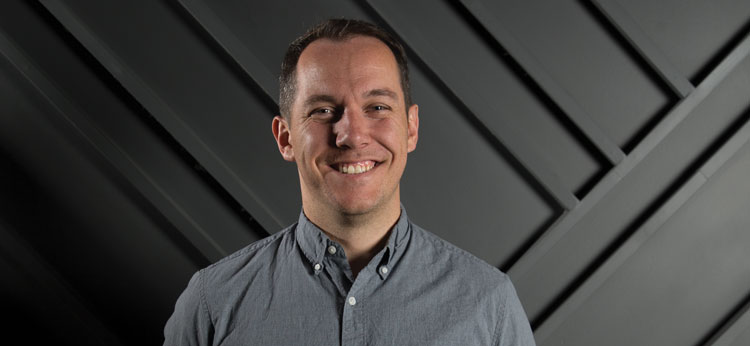
Photo of Kimball Dean Parker by Benjamin Hager/ABA Journal
Automated for the People
With Kimball Dean Parker’s tools, people are better able to access the justice system
By Lorelei Laird
Kimball Dean Parker’s first legal technology business was not a moneymaker. But it planted a seed.
CO/COUNSEL, launched in 2015, was an attempt to crowdsource detailed explanations of the law. One law professor who liked and used CO/COUNSEL was Gordon Smith, dean of Brigham Young University’s J. Reuben Clark Law School. In 2016, Smith asked Parker to help him launch an entrepreneurial legal technology clinic at the school.
“I thought the hardest part is to get somebody who will be excited to teach this. And I remembered Kimball,” Smith says.
For the inaugural challenge in the fall of 2017, the students created SoloSuit, an online tool to help defendants file responses to debt collection lawsuits.
The response amazed them. SoloSuit received more visitors to its website in a month than they’d expected for the year.
Parker’s law firm at the time, Salt Lake City-based Parsons Behle & Latimer, asked him to try something similar there, so he and his business partner, Lincoln Porter, put together a tool that could help businesses automate part of their efforts to comply with the European Union’s General Data Protection Regulation, a landmark privacy law that went into effect in May 2018.
“It was profitable in like three or four weeks. It brought in tons of clients into the firm,” Parker, 35, says.
And that’s how Parker came to the attention of Wilson Sonsini Goodrich & Rosati, which launched a software subsidiary, SixFifty, in February with Parker as president and Porter as CTO. SixFifty makes the same sort of automated tools but backed with the expertise and financial resources of a BigLaw firm.
SixFifty’s first project along those lines will be aimed at compliance with the California Consumer Privacy Act, which goes into effect Jan. 1. After that, SixFifty plans to launch Hello Landlord, a pro bono tool to help pro se litigants facing eviction developed with idea innovator LawX and the University of Arizona’s James E. Rogers College of Law.
If there’s a theme connecting the two projects, Parker says, it’s “making kind of top-level legal expertise available to as many people as possible.”
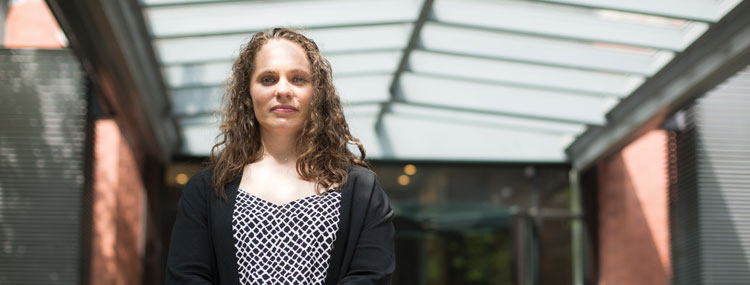
Photo of Cynthia Conti-Cook by Arnold Adler/ABA Journal
Policing the Police
Cynthia Conti-Cook crunches the numbers to hold NYPD accountable for misconduct
By Jason Tashea
The framed indictment hangs on Cynthia Conti-Cook’s office wall.
It’s from 1967, and the charge is draft evasion. The defendant is her father, Jack Cook, an activist and writer who spent two years in prison.
The indictment is “a reminder that every caption has a human being behind it, that those human beings are often loved ones,” says Conti-Cook, 38.
Today, as a staff attorney at the special litigation unit at the New York Legal Aid Society, that reminder is the cornerstone of a career that seeks justice by speaking truth to power through litigation and data.
After graduating from the City University of New York School of Law in 2006, Conti-Cook became a civil rights attorney with Stoll, Glickman & Bellina. While there, she brought more than 100 civil rights cases against corrections and police officers.
Through this work, she began to see patterns of police abuse that were punishing minority communities and costing the city millions. She wanted to find systemic trends in the abuse to stop it from happening in the first place.
Conti-Cook was “somebody who really was fighting for real community engagement around the abuses that were happening in black and brown communities around policing,” says Tina Luongo, who leads the criminal defense practice at the Legal Aid Society.
Today, the Cop Accountability Project houses information on all NYPD officers, including 10,000 with a paper trail of alleged or proven misconduct. The data is collected from news sources, state and federal lawsuits, New York City Civilian Complaint Review Board and NYPD Internal Affairs Bureau investigations, social media and the office’s own experiences.
The data has also had a systemic impact, leading to litigation that challenged the racially biased application of loitering laws by New York police against trans sex workers of color. This led to procedure and practice changes at the NYPD, according to Luongo.
While the impact of Conti-Cook’s work is already felt in New York, there’s more to come.
“I think that 10 years from now, there will be a lot of new developments in the way in which we think about this kind of information and the way in which lawyers access information that will be inspired by this idea,” she says.
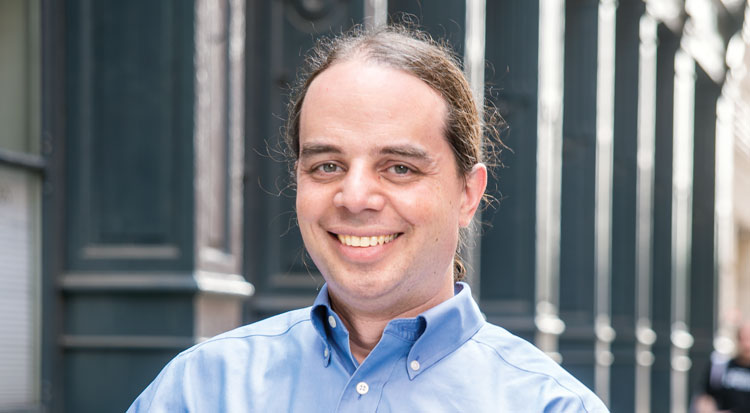
Photo of Jonathan Pyle (c) David Fonda
Doc It Yourself
Lawyers, organizations design task-automation software with Jonathan Pyle’s Docassemble
By Stephanie Francis Ward
At age 7, Jonathan Pyle taught himself to write computer programs by reading a book about BASIC for kids.
“One of the first programs I typed in was a program that asked ‘What is your name?’ and then when you typed in your name, it would say, ‘Hello, Jonathan.’ I thought that was supercool,” Pyle says.
He’s been coding ever since. In 2015, he built Docassemble, a free, open-source platform for expert systems and document assembly. People use it to assemble filings for a variety of legal issues, including divorce, eviction and Chapter 7 bankruptcy.
“It is kind of funny that, years later, I wrote an open-source software package with 60,000 lines of code that is a platform for basically doing that exact same thing,” says Pyle, who graduated from the University of Pennsylvania Law School in 2002.
A former law firm associate who did class-action defense work, Pyle, 42, came to Philadelphia Legal Assistance in 2008. In 2010, he became the agency’s contract performance officer.
“Compliance was sucking up hours of my time every year,” says Anita Santos-Singh, the organization’s executive director. “[Pyle] was able to automate it, and now it’s a very small piece of his job. He spends the bulk of his time looking at contracts and working on technology tools that support our work.”
Inspiration for Docassemble came when Pyle was using HotDocs to interview family law clients and felt that more could be done than what the automated software offered.
Among those using Docassemble are Upsolve, a free service that assembles Chapter 7 bankruptcy forms, started by fellow 2019 Legal Rebels Rohan Pavuluri and Jonathan Petts. Documate also uses Docassemble, as does Boston’s Volunteer Lawyers Project, which uses it for appeals on Social Security income over payment appeals. Quinten Steenhuis, a senior attorney and network administrator with Greater Boston Legal Services, used Docassemble to build Massachusetts Defense for Eviction, a do-it-yourself document generator.
“It’s as easy to use as Facebook; you’re checking boxes and choosing from menus,” says Steenhuis, who estimates that since they launched MADE in November 2018, it has helped over 700 tenants prepare answers and requests for discovery in eviction cases.
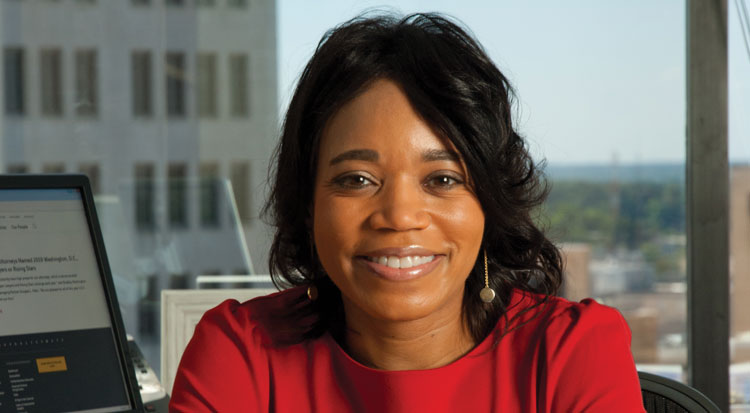
Photo of Tiffany Graves by David Mudd/ABA Journal
Close to Home
Mississippi ranks last when it comes to access to justice; Tiffany Graves hopes to change that
By Jason Tashea
Growing up in a working-class household and with a large extended family in Virginia’s Shenandoah Valley, Tiffany Graves knows what it looks like when a lawyer’s services are out of reach.
They were living paycheck to paycheck and could have benefited from legal representation in housing or custody disputes, but they couldn’t afford it.
“I really do see a lot of my work as very personal,” says Graves, 44, who graduated from the University of Virginia School of Law in 2006 and is pro bono counsel at Bradley Arant Boult Cummings in Jackson, Mississippi.
In Mississippi, 695,000 residents—of 3 million—live in poverty. Statewide, there are fewer than 7,000 attorneys. In 2016, the National Center for Access to Justice ranked the state dead last on its use of civil justice best practices. These numbers make a career in access to justice a challenge, says state Chancery Judge Jacqueline Mask.
Undeterred, Graves went on to run the Mississippi Volunteer Lawyers Project, where she launched the state’s first online legal help portal, and the University of Mississippi School of Law’s Pro Bono Initiative, where she helped enact a state supreme court rule allowing law students the limited ability to practice in pro bono clinics.
Then in 2014, Graves became executive director of the state supreme court’s Mississippi Access to Justice Commission. (Disclosure: The author provided pro bono technology support to the commission for an unrelated project while Graves was its director.)
Starting in one county, Graves created a toolkit that made it easy to open similar clinics districtwide and across the state.
At Bradley, the firm essentially created the pro bono counsel position for Graves, says Dylan Black, a partner and chair of the firm’s pro bono committee.
In this role, Graves has more than 500 lawyers in 10 offices across six states and Washington, D.C., who can help tackle the justice gap. In her first year, the firm reported that total pro bono hours completed increased 39%, and the number of attorneys completing more than 20 pro bono hours a year rose 69%.
Write a letter to the editor, share a story tip or update, or report an error.


